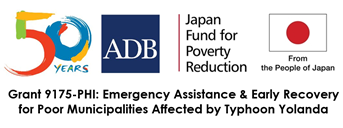The Department of Interior and Local Government is conducting a series of technical consultation workshops, where representatives of 30 Local Government Units (LGUs) from the Yolanda-affected areas of Eastern Visayas (Region VIII) were invited as participants. These workshops aim to guide and support LGUs in formulating risk-informed Comprehensive Land Use Plans (CLUPs) and Comprehensive Development Plans (CDPs) by mainstreaming climate and disaster risk assessment results consistent with CLUP and CDP Guidelines and the provisions of DILG MC No. 2015-77.

The first workshop, held 13-17JUN2016 at Leyte Park Hotel in Tacloban, focused on honing skills of the LGU representatives on the use of a free Geographic Information Systems (GIS) application, in order for them to visually illustrate their respective LGUs’ land use plans that they are going to develop during this series of workshops.

The rigid weeklong workshop was actually not enough! Some of the participating LGUs were unable to finish their required outputs. But coaching sessions were readily scheduled at partner state universities to further the learnings of these 30 LGUs. Experts and trainers divided them into 3 clusters for dedicated and more focused mentoring sessions.

27JUN2016, Cluster 1, composed of representatives from Eastern Samar municipalities of Giporlos, Guiuan, Salcedo, Quinapondan, Gen. MacArthur, Hernani, Llorente, Balangkayan and Maydolong, attended their first coaching session at Eastern Samar State University (ESSU) with just the town of Mercedes missing the opportunity.

28JUN2016, Cluster 2, composed of representatives from Daram, Talalora, Sta Rita and Villareal towns all in (Western) Samar and Capoocan, Carigara, Tunga, San Miguel and Babatngon towns in Leyte, attended a similar coaching session held at Eastern Visayas State University (EVSU) in Tacloban City.

While on 29JUN2016, Cluster 3, composed of representatives from Alang-alang, Baybay City, Burauen, Dagami, Jaro, Javier, Julita, La Paz, Pastrana, Sta. Fe and Tabontabon had their own coaching session also at EVSU.
Via the dedicated coaching sessions, participants are accorded more time to learn more knowledge and practice their skills on climate change adaptation, disaster risk reduction, geographic information systems (GIS) and various software applications such as Quantum GIS (QGIS). Their outputs from the first workshop and these mentoring sessions become their inputs and tools in succeeding workshops.
Also in attendance as participants of these activities are representatives from each of the provincial planning and development offices of the provinces of Eastern Samar, (Western) Samar and Leyte. They play crucial roles towards attaining risk-informed CLUPs and CDPs since they consolidate and plan for the province-wide versions. Likewise, taking active participation are experts from the 3 partner state universities (ESSU, EVSU and VSU) as they are envisioned to perpetuate this approach for other LGUs in Region VIII, perhaps even to the rest of the country.
This series of activities are part of DILGs project deliverables as implementing agency in what is called “Sub-component C1: Resilience by mitigating vulnerability causes related to land use management, management of critical assets, and disaster preparedness” under a grant from the Japan Fund for Poverty Reduction (JFPR) managed by the Asian Development Bank (ADB) called “Grant 9175-PH: Emergency Assistance and Early Recovery for Poor Municipalities Affected by Typhoon Yolanda”.
A consortium of 3 consulting firms (CONCEP, GEOS and ASSURE) is the implementing partner of DILG on this effort. They provide expert facilitators and mentors on ground to implement the program.
This sub-component does not only seek to educate and train participants from the 30 LGUs. It will also provide equipment to each participating city, municipality, provincial office and partner state university, to ensure that all are properly equipped with needed software and hardware towards creating risk-informed CLUPs and CDPs where climate and disaster risk assessments are already mainstreamed.
Here are some videos:
The second workshop is coming!











0 comments:
Post a Comment